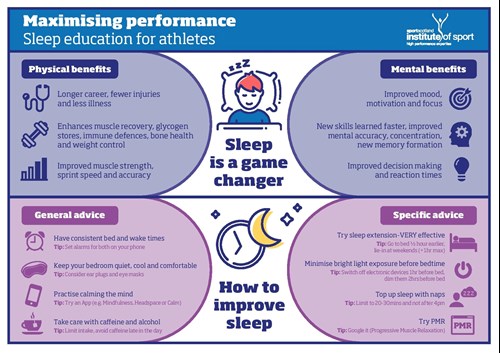We spend around a third of our life asleep and there is no doubt about the importance it plays in day-to-day life, as well as sporting performance. Whatever level of physical activity or sport you are participating in, sleep has a crucial role in your performance.
Often overlooked and compromised, sleep enables the human body to recover and prepare for what is ahead – from general wakefulness to high levels of activity. Demands of modern life have changed the way we schedule our daily activities, so the biological drive for sleep is either ignored or somehow weakened by external cues, such as light exposure and lifestyle.
This can ultimately lead to people delaying their bedtime and reducing the amount of sleep they get. An example of this in reality was when Reed Hastings (CEO, Netflix) described the biggest competitor to the growth of the entertainment organisation as… you guessed it, sleep.
Scientific and medical research has found that sleep is linked to a number of areas of health, wellbeing and performance, with findings indicating that disrupted or poor-quality sleep is an immediate threat as a result of imposed schedules, like night-shift working, that cause individuals to change daily routines frequently.
This has been termed ‘social jet lag’, which is the misalignment between the internal body clock and the sleep/wake cycle. As you can imagine this has been negatively linked to various performance factors, ultimately resulting in restrictions and limitations on day-to-day life.
Disturbed sleep can cause changes to brain function, physical performance and psychological wellbeing – reduced motivation levels, decreased attention span, poor concentration and increases in sensation of pain have all been shown as side effects. Sleep deprivation has also been shown to have a negative impact on performance in physical tasks, so to get the most out of your sporting endeavours make sure you get a good sleep.
How to get enough sleep
Many people find it useful to track how much sleep they are actually getting. There are several ways to do this, with the most simple being a sleep diary consisting of:
- How many hours’ sleep did I get?
- How well did I sleep?
Research suggests that this might be as good a method as any to monitor sleep quantity and quality, as sleep is a complex series of physiological processes and can be difficult to measure accurately.
Recently there has been a big influx of new technology, apps and smart watches that can monitor sleep. These can be a useful way to raise awareness and help quantify sleep in some ways, but please remember it will not give us all the answers. Ultimately, if you are interested in tracking your sleep patterns over a period of time, find a way to monitor sleep that engages you, but remember you might not actually need that new gadget to do it.
So how do we get the amount and quality of sleep that we require? Much of this is up to you – a good structure and some self-discipline can help improve sleep, rest and recovery.
Sleep hygiene is a phrase used to refer to the behavioural measures that we can put in place to promote sleep when we desire it. Here are some points to think about:
- Consider having a consistent bedtime and set of behaviours before bed. This will prepare your body for sleep.
- It is important to make time for sleep and, in general, we should aim for at least seven hours. This sounds like common sense but is often overlooked.
- Don’t forget you can extend sleep both ways – by rising later or by going to bed earlier.
- Consider the bedroom environment, which generally should be dark, quiet and at a cool temperature to promote sleep. If required, use eye-masks or ear plugs to create the perfect sleeping environment.
- Finally, it is a good idea to resist the temptation of using smartphones, tablets and television in the time immediately before bed. These devices emit strong, blue wavelength light that stimulates the brain into thinking it is day time. This will make you less sleepy and it could be more difficult to fall asleep.
Perhaps Reed Hastings was right and we are directly competing with 21st-century technology in our quest to sleep for success.

